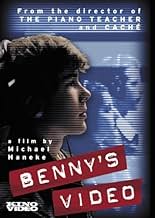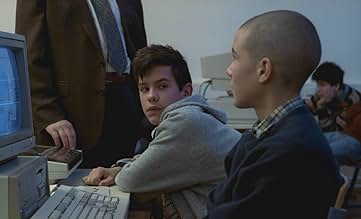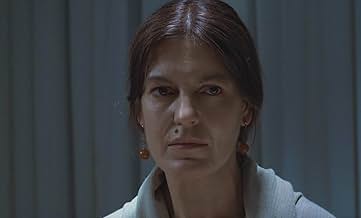AVALIAÇÃO DA IMDb
7,1/10
20 mil
SUA AVALIAÇÃO
Um entusiasta de 14 anos está tão envolvido na fantasia do cinema que não consegue mais se relacionar com o mundo real, a ponto de cometer um assassinato e registrar uma confissão para seus ... Ler tudoUm entusiasta de 14 anos está tão envolvido na fantasia do cinema que não consegue mais se relacionar com o mundo real, a ponto de cometer um assassinato e registrar uma confissão para seus pais.Um entusiasta de 14 anos está tão envolvido na fantasia do cinema que não consegue mais se relacionar com o mundo real, a ponto de cometer um assassinato e registrar uma confissão para seus pais.
- Prêmios
- 2 vitórias e 3 indicações no total
Imelda Marcos
- Self
- (cenas de arquivo)
- (não creditado)
Hans Meiser
- Self
- (cenas de arquivo)
- (não creditado)
Brigitte Reimann
- Self
- (cenas de arquivo)
- (não creditado)
Martin Schoendeling
- Sales manager in videostore
- (não creditado)
Avaliações em destaque
It's all about shock value. Haneke's intro for this one is to desensitize you for the rest. What happened with the teenagers is nothing compared to what we see first because the first one is real (and we know it's real), what happened with the teenagers is fake and off-camera.
The discussion happens from this point. Why aren't we more shocked? Why is Benny so insensitive to what he did? It's because of his hobby. He doesn't see it as real, it's all from his camera point of view, like everything he saw before. It's just digital or analog information put on screen. He sees himself as a viewer and a camera at the same time. He is dehumanized, he is a machine, that gun was part of him as well. And like all Haneke, it's shocking.
The discussion happens from this point. Why aren't we more shocked? Why is Benny so insensitive to what he did? It's because of his hobby. He doesn't see it as real, it's all from his camera point of view, like everything he saw before. It's just digital or analog information put on screen. He sees himself as a viewer and a camera at the same time. He is dehumanized, he is a machine, that gun was part of him as well. And like all Haneke, it's shocking.
"Benny's Video" focuses on a maladjusted teenager who is obsessed with technology, particularly video recording and television. He is largely ignored by his upper-class parents who feed his obsession by arming him with the latest and greatest technology, until mom and dad are forced to confront a shocking act of violence he commits.
For anyone who knows Michael Haneke's filmography even on a tertiary level, they will be aware of his bleak depictions of society and frank, unembellished representations of human depravity. This earlier work from the director has his trademarks all over it, and is bolstered by strong performances from Arno Frisch as the disturbed Benny, with Angela Winkler and Ulrich Mühe giving disturbing and calculated performances as his emotionally detached parents.
While the film gets off to a rather startling beginning, some will find the midsection and conclusion to be a bit slow; although they may be correct in pointing out slight pacing issues, the latter part of the film allows the character dynamics between parent and child (and parent and parent) to be expanded upon, and what is perhaps most shocking about it is that the audience grows to develop some sympathy for Benny despite his sociopathy; his parents, less so. There is also a notable contemplation of technology and its function in society that underpins the screenplay.
All in all, "Benny's Video" is an effective, disturbing film that speaks more to the brokenness of the family unit than it does of the malignant outcomes that may arise from it. Certainly not for the lighthearted, but it offers a drab and uncompromising window into the dark. 8/10.
For anyone who knows Michael Haneke's filmography even on a tertiary level, they will be aware of his bleak depictions of society and frank, unembellished representations of human depravity. This earlier work from the director has his trademarks all over it, and is bolstered by strong performances from Arno Frisch as the disturbed Benny, with Angela Winkler and Ulrich Mühe giving disturbing and calculated performances as his emotionally detached parents.
While the film gets off to a rather startling beginning, some will find the midsection and conclusion to be a bit slow; although they may be correct in pointing out slight pacing issues, the latter part of the film allows the character dynamics between parent and child (and parent and parent) to be expanded upon, and what is perhaps most shocking about it is that the audience grows to develop some sympathy for Benny despite his sociopathy; his parents, less so. There is also a notable contemplation of technology and its function in society that underpins the screenplay.
All in all, "Benny's Video" is an effective, disturbing film that speaks more to the brokenness of the family unit than it does of the malignant outcomes that may arise from it. Certainly not for the lighthearted, but it offers a drab and uncompromising window into the dark. 8/10.
From its opening sequence, the film immerses us in Benny's world, an adolescent who lives through the images he captures with his handycam and what he watches on television. These images, where reality, media, and fantasy blend without clear boundaries, shape his perception of the world: saturated with spectacles, chaotic, and lacking deep understanding.
The plot gradually reveals that this apparent visual chaos conceals something far darker and macabre. Benny receives an advanced video camera from his parents, a gift intended to compensate for the lack of affection in his upbringing. However, this present becomes a tool that allows him to emotionally isolate himself and create his own world through the lens, disconnecting even more from his family and social environment.
Haneke's cold, clinical style enhances this disconnection, with slow-paced direction that emphasizes unsettling details, like Benny's manipulation of recordings. This approach leads us to a profound examination of the influence of media on the perception of reality, the normalization of violence, and the emotional impact it has on the youth.
A key symbol in the narrative is the video of the pig's slaughter, recorded by Benny. This repeated act not only desensitizes him to violence but also reinforces the notion that, for him, reality turns into a spectacle that can be controlled, edited, and replayed at will.
The film raises essential questions about the boundaries between reality and fiction, the responsibility of parents in the emotional formation of their children, and how media and technology shape our behavior and perception of the world. Although the story was conceived in another era, it eerily anticipates our present, where life seems not to exist unless it's captured on camera or posted on social media.
The plot gradually reveals that this apparent visual chaos conceals something far darker and macabre. Benny receives an advanced video camera from his parents, a gift intended to compensate for the lack of affection in his upbringing. However, this present becomes a tool that allows him to emotionally isolate himself and create his own world through the lens, disconnecting even more from his family and social environment.
Haneke's cold, clinical style enhances this disconnection, with slow-paced direction that emphasizes unsettling details, like Benny's manipulation of recordings. This approach leads us to a profound examination of the influence of media on the perception of reality, the normalization of violence, and the emotional impact it has on the youth.
A key symbol in the narrative is the video of the pig's slaughter, recorded by Benny. This repeated act not only desensitizes him to violence but also reinforces the notion that, for him, reality turns into a spectacle that can be controlled, edited, and replayed at will.
The film raises essential questions about the boundaries between reality and fiction, the responsibility of parents in the emotional formation of their children, and how media and technology shape our behavior and perception of the world. Although the story was conceived in another era, it eerily anticipates our present, where life seems not to exist unless it's captured on camera or posted on social media.
In his second film of the "glaciation trilogy", Haneke once more hauntingly draws a torpid affluent society where the people live at cross purposes, where conservations are rare and toilsome, where communication is alienated to a technical process. Accordingly to that, the emotional life of the protagonists became stunted: Benny, after his "act", shows concernment only through surrogate actions, just like letting his hair cropped. The father immediately slyly pushes to damage mitigation, whereas only the mother indicates rudiments of emotion, though somehow tense. In a confusing blend of film and video images, Haneke creates a second level of reality, so to speak, where Benny's senseless "act" perfectly integrates in the horror pictures of the evening news and makes it open for question. At the same time, Haneke commits himself to no specific answer and denies any absolution. That is what makes this film so horrifying - there simply is no telling argument that makes a murderer out of a young boy.
What makes BENNY'S VIDEO so disturbing is threefold:
#1- Benny (Arno Frisch) himself. We get the definite impression that something isn't quite right about him from the beginning. Mr. Frisch plays Benny with cold, lifeless ease. He is just going through the motions of everyday existence. When the unthinkable occurs, it's very matter-of-fact, like brushing crumbs off a table.
#2- Benny's parents (Angela Winkler and Ulrich Muhe). They are almost as mindless as their son. After watching the video, their reaction is, while not altogether unexpected, jaw-dropping nonetheless.
#3- Director Michael Heneke, who keeps everything clinical and icy. He shows us a psychopath in a "normal" environment, just doing the daily routines. The shocking parts are presented as mere interruptions in the daily grind. The motives of all concerned are what bring out the true terror. There are no masked maniacs here, only upper class people forced to deal with an "unfortunate" problem.
A classic film about the horror of indifference and self-preservation...
#1- Benny (Arno Frisch) himself. We get the definite impression that something isn't quite right about him from the beginning. Mr. Frisch plays Benny with cold, lifeless ease. He is just going through the motions of everyday existence. When the unthinkable occurs, it's very matter-of-fact, like brushing crumbs off a table.
#2- Benny's parents (Angela Winkler and Ulrich Muhe). They are almost as mindless as their son. After watching the video, their reaction is, while not altogether unexpected, jaw-dropping nonetheless.
#3- Director Michael Heneke, who keeps everything clinical and icy. He shows us a psychopath in a "normal" environment, just doing the daily routines. The shocking parts are presented as mere interruptions in the daily grind. The motives of all concerned are what bring out the true terror. There are no masked maniacs here, only upper class people forced to deal with an "unfortunate" problem.
A classic film about the horror of indifference and self-preservation...
Você sabia?
- CuriosidadesFilm debut of Arno Frisch, best known for his performance in Michael Haneke's Violência Gratuita (1997).
- Erros de gravaçãoWhen Benny leaves the phone booth in Egypt, the cameraman is visible in multiple window reflections.
- ConexõesFeatured in Zomergasten: Episode #9.5 (1996)
Principais escolhas
Faça login para avaliar e ver a lista de recomendações personalizadas
- How long is Benny's Video?Fornecido pela Alexa
Detalhes
Contribua para esta página
Sugerir uma alteração ou adicionar conteúdo ausente



























